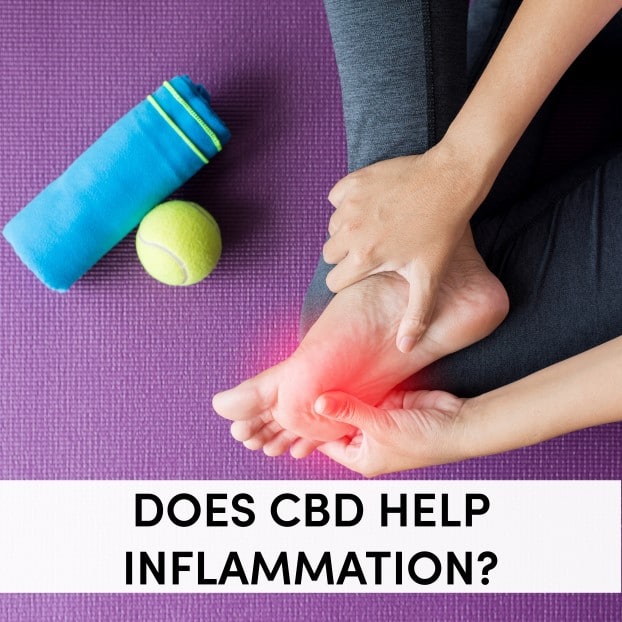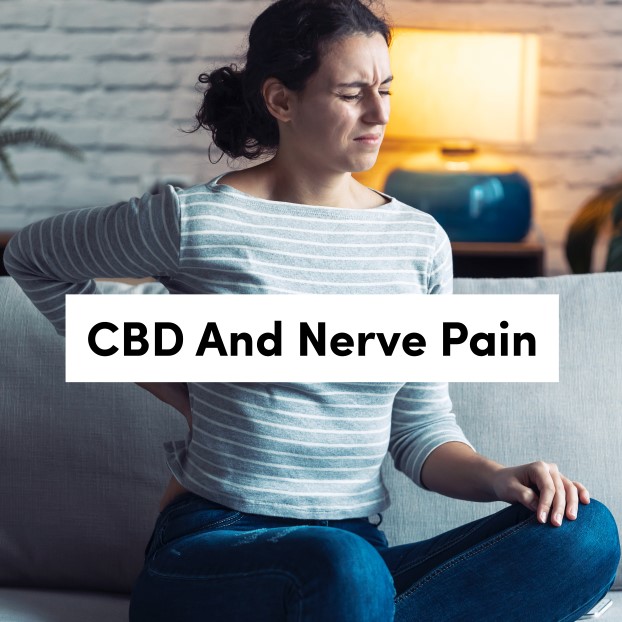Does CBD Help With Inflammation?

Posted on May 3rd, 2021
We can loosely define inflammation as the body tissues’ biological response to harmful stimuli. Damaged cells, pathogens, a foreign object, and toxic compounds entering in contact with the tissue can all elicit this response. In an attempt to protect itself from infections and internal severe tissue damage, the body triggers inflammation as a response.
It usually acts as the body’s protective response to clear out any infections due to tissue damage and necrotic cells. Thus, the process involves blood vessels, immune cells, and molecular mediators that strive to protect the body from harm.
The most common signs of inflammation include pain, redness, loss of function, and swelling of the affected part. A particular system within our bodies might be able to interact with a compound known as CBD to help us manage inflammation. However, let’s first learn about inflammation itself before going into how does CBD help with inflammation. Let’s begin.
What Causes Inflammation in Our Bodies
Several things might be to blame or cause inflammation in our bodies. They generally fall within the following categories:
- Pathogens (fungi, bacteria, viruses, etc.)
- External injuries (scrapes, scalding, etc.)
- Exposure to harmful chemicals and radiation.
- A medical condition or disease (mostly ending with ‘-it is’ e.g., arthritis, bronchitis, dermatitis).
There are two types of inflammation you need to know about. These are:
- Acute inflammation.
- Chronic inflammation.
a. Acute Inflammation
Under normal circumstances, the body will respond to stimuli, such as a bee sting, by inflaming the area until removing the threat. This is what medical practitioners like to call acute inflammation. Acute inflammation occurs in a short time and mostly in response to a tissue injury or limited exposure to a pathogen. The condition’s most identifiable characteristics are redness, pain, swelling, heat, and loss of function in the affected area/region.
b. Chronic Inflammation
Chronic inflammation is the type of inflammation lasting for more extended periods, usually several months and even years. Unknown to many, acute inflammation can progress into chronic inflammation in some cases when left untreated. This can be due to an infection, injury resulting in an autoimmune disorder that mistakeably starts attacking healthy tissues leading to even bigger issues. If left untreated, the continued inflammation may lead to tissue death, internal scarring, and even DNA damage. Chronic inflammation is thus something linking to many terminal conditions, including:
- Cancer
- Heart disease
- Rheumatoid arthritis
- Obesity
- Asthma
- Diabetes
- Psoriasis
- Alzheimer’s Disease.
Chronic inflammation is, thus, a very real risk to your overall health and wellbeing.
What Exactly Happens When We Experience Inflammation
Several immune system cells are involved when inflammation occurs. These cells release plasma proteins and leukocytes, popularly known as inflammatory mediators. Specifically, histamine and bradykinin, which target the ‘foreign’ body in the affected area or part. Both of those hormones cause small blood vessels in the affected tissue to dilate in order to allow more blood to pass. Thus, the reason why the injured part feels hot and may turn red in color at times.
The increase in blood flow allows for more of these immune response cells to access the injured tissue easily. Thus, allowing to quickly commence the healing process.
The heavy presence of these inflammatory mediators irritates the nerves around the area. Meanwhile, the injured area sends pain signals directly to the brain as a form of letting you know it received damage. It is also worth noting that, as more of these fluids enter the inflamed tissue, the more it swells. This explains the swelling on injured or irritated parts of the body. However, the excess fluids in the affected area should clear off with time. It usually takes about three days to clear out completely in the case of acute inflammation.
Inflammation will also cause mucous membranes to release more fluids as well. This is the case when having a stuffy nose or a nasty cough; it causes the lining of the trachea and nose to inflame. The increased production of mucous flushes out any viruses, germs, or pollen in the inflamed area when you sneeze or cough.
What Are Cannabinoids
Cannabinoids are compounds that occur naturally in the cannabis or hemp plant. The most commonly known cannabinoids include THC (tetrahydrocannabinol), CBD (cannabidiol), Cannabigerol (CBG), cannabinol (CBN), and cannabichromene (CBC), among several others. Cannabinoids have a rich profile, with many of these packing potent medicinal and therapeutic properties. Thus, they might come in handy in treating/managing various health conditions. This is true with most cannabinoids, with the exception of THC, which has psychoactive properties. Thus, it triggers a high when consumed. All the other cannabinoids so far seem safe to use, according to most research.
What Is CBD
Cannabidiol denoted as CBD, is the second most prevalent compound found in the cannabis plant. CBD also occurs abundantly in the hemp plant, and it became a very used ingredient in products, including oils and edibles. CBD, unlike THC, isn’t psychoactive; hence, it may help people with various health conditions. The compound recently saw use to treat epilepsy in children. It may also help with arthritis, acne, psoriasis, and several other inflammation-related health conditions. CBD also seems to pack potent analgesic and anti-inflammatory properties that make it a worthy candidate for treating various forms of inflammation.
Effects and Benefits Of CBD
Reduces Epileptic Seizures
CBD proves time and again to be quite effective in reducing epileptic seizures in children. According to research, taking CBD reduces the frequency of these seizures enabling patients to lead an almost normal life. Doctors believe the rich anti-inflammatory profile of CBD and how it interacts with the endocannabinoid system to be the reason for its effectiveness. The FDA also approved a CBD-based drug, Epidiolex, to treat Dravet Syndrome and Lenox-Gastaut Syndrome.
Relief from Chronic Pains
Medical marijuana and CBD might provide a kind of pain relief that might be quite convenient for arthritis patients. This is because CBD packs potent analgesic properties that help fight off the pain – it interacts with CB1 receptors to facilitate this. Topical CBD cream specifically appears to also work great for inflammation and pain stemming from physical blows to the body.
PTSD Treatment
CBD is apparently able to reduce signs and symptoms of post-traumatic stress disorder as well. Many PTSD-stricken patients that ingested it report a reduction in nightmares and sleeplessness after using CBD for some time. This is because CBD works at the cellular level by interacting with the ECS to trigger a sense of calmness and mental clarity, reducing PTSD episodes.
Anti-Inflammatory Treatment
CBD has potent anti-inflammatory properties. It works by preventing the formation of superoxide radicals that cause oxidative stress in body cells. It also seems able to protect non-enzymatic antioxidants in the body. Thus, coming in handy in preventing certain inflammatory conditions, including diabetes, psoriasis, and arthritis.
How Does CBD Help With Inflammation?
CBD interacts quite well with the endocannabinoid system (ECS) through the CB1 and CB2 receptors. The ECS has a hand at regulating most of the processes in the body. It is responsible for overseeing everything from:
- Digestion
- Appetite
- Metabolism
- Inflammation
- Pain-sensation
- Sleep
- Memory
- And even stress
One could argue that the ECS acts as a bridge between the brain and the rest of the body. That said, the ECS is also responsible for triggering the release of certain hormones in the body. Those include immune system cells that might act on possible pathogens invading the body. Thus, a properly functioning ECS system triggers the release of just enough lymphocytes to the affected parts to protect the body from infection.
The ECS is, however, susceptible to malfunctioning, causing increased production or release of immune system cells than necessary. CBD interacts or binds onto CB1 and CB2 receptors helping the ECS restore homeostasis, thus managing inflammation. CBD also binds onto TRPC ion channels that help activate and deactivate GPR55 receptors. Thus, helping manage inflammation and pain even further. In other words, the presence of CBD in the blood does help manage conditions including arthritis, psoriasis, diabetes, blood pressure, asthma, and others. This, thus, answers the question of how does CBD help with inflammation.
The Best Way to Take CBD For Inflammation
With the market already flooded with CBD in different forms, it can be quite challenging to know which is the best CBD for inflammation. The best method to take CBD is subjective as it depends on the condition you want to treat. Some of the preferred and recommended CBD consumption methods include:
Smoking/Vaping (Inhalation)
This is one of the best and considerably more effective ways to take CBD. The effects are almost instantaneous as the compound enters directly into the bloodstream through the lungs. However, smoking and vaping might be better to treat inflammation stemming from allergies.
Ingestion
You can also ingest CBD, in the form of gummies, especially for conditions such as diabetes, blood pressure, and arthritis. The effects of CBD will, however, take some time before they can start to show. This is because CBD will first need to undergo digestion before it goes into the bloodstream.
Topical Application
Topical application is one of the best ways to use CBD for fast action. CBD creams, ointments, and balms are usually best for skin conditions, sore muscles, migraines, and rheumatic arthritis. All you need is to massage the area with the balm and give it time to work. The best thing about the topical application is that it is relatively easy to use and doesn’t need extra tools. It is also quite effective for conditions such as psoriasis, acne, and inflammation.
Does CBD Help With Inflammation? – The Takeaway
CBD interacts with the endocannabinoid system (ECS) to restore homeostasis, possibly fighting/preventing inflammation in the body. This, thus, reduces the risk of chronic inflammation and might even help reduce the severity of certain conditions as well. By interacting with CB1 and CB2 receptors, the patient will have fewer episodes of pain, making it easier to manage the condition. It would, however, be better to talk to your doctor if planning to start using CBD products. Be sure to buy the highest quality CBD products for the best results.

Related Posts in CBD for Pain

Oct 7 2021
Your Questions About CBD Salve For Nerve Pain? Answered!
Read More →
Sep 19 2021
Pain Cream 101: Check out the Benefits, Ingredients & More
Read More →
May 17 2021
CBD and Arthritis: Making it Easier to Deal With Joint Pain?
Read More →
May 16 2021

